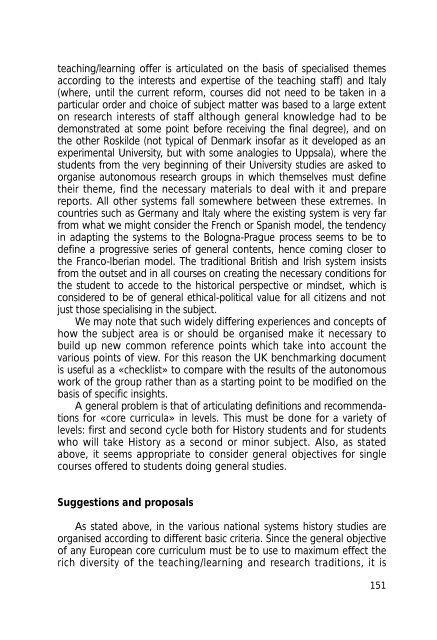Final Report Pilot Project - Relaciones Internacionales de la ...
Final Report Pilot Project - Relaciones Internacionales de la ...
Final Report Pilot Project - Relaciones Internacionales de la ...
Create successful ePaper yourself
Turn your PDF publications into a flip-book with our unique Google optimized e-Paper software.
teaching/learning offer is articu<strong>la</strong>ted on the basis of specialised themes<br />
according to the interests and expertise of the teaching staff) and Italy<br />
(where, until the current reform, courses did not need to be taken in a<br />
particu<strong>la</strong>r or<strong>de</strong>r and choice of subject matter was based to a <strong>la</strong>rge extent<br />
on research interests of staff although general knowledge had to be<br />
<strong>de</strong>monstrated at some point before receiving the final <strong>de</strong>gree), and on<br />
the other Roskil<strong>de</strong> (not typical of Denmark insofar as it <strong>de</strong>veloped as an<br />
experimental University, but with some analogies to Uppsa<strong>la</strong>), where the<br />
stu<strong>de</strong>nts from the very beginning of their University studies are asked to<br />
organise autonomous research groups in which themselves must <strong>de</strong>fine<br />
their theme, find the necessary materials to <strong>de</strong>al with it and prepare<br />
reports. All other systems fall somewhere between these extremes. In<br />
countries such as Germany and Italy where the existing system is very far<br />
from what we might consi<strong>de</strong>r the French or Spanish mo<strong>de</strong>l, the ten<strong>de</strong>ncy<br />
in adapting the systems to the Bologna-Prague process seems to be to<br />
<strong>de</strong>fine a progressive series of general contents, hence coming closer to<br />
the Franco-Iberian mo<strong>de</strong>l. The traditional British and Irish system insists<br />
from the outset and in all courses on creating the necessary conditions for<br />
the stu<strong>de</strong>nt to acce<strong>de</strong> to the historical perspective or mindset, which is<br />
consi<strong>de</strong>red to be of general ethical-political value for all citizens and not<br />
just those specialising in the subject.<br />
We may note that such wi<strong>de</strong>ly differing experiences and concepts of<br />
how the subject area is or should be organised make it necessary to<br />
build up new common reference points which take into account the<br />
various points of view. For this reason the UK benchmarking document<br />
is useful as a «checklist» to compare with the results of the autonomous<br />
work of the group rather than as a starting point to be modified on the<br />
basis of specific insights.<br />
A general problem is that of articu<strong>la</strong>ting <strong>de</strong>finitions and recommendations<br />
for «core curricu<strong>la</strong>» in levels. This must be done for a variety of<br />
levels: first and second cycle both for History stu<strong>de</strong>nts and for stu<strong>de</strong>nts<br />
who will take History as a second or minor subject. Also, as stated<br />
above, it seems appropriate to consi<strong>de</strong>r general objectives for single<br />
courses offered to stu<strong>de</strong>nts doing general studies.<br />
Suggestions and proposals<br />
As stated above, in the various national systems history studies are<br />
organised according to different basic criteria. Since the general objective<br />
of any European core curriculum must be to use to maximum effect the<br />
rich diversity of the teaching/learning and research traditions, it is<br />
151


